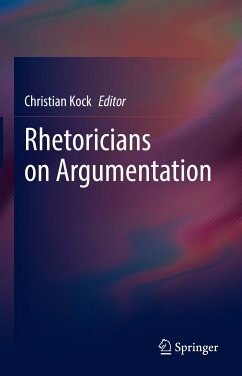
In Defense of Polemics (eBook, PDF)
Versandkostenfrei!
Sofort per Download lieferbar
80,95 €
inkl. MwSt.
Weitere Ausgaben:

PAYBACK Punkte
40 °P sammeln!
This book revisits the definition of polemical discourse and deals with its functions in the democratic sphere. It first examines theoretical questions concerning the management of disagreement in democracy and the nature of polemical discourse. Next, it analyses case studies involving such issues as the place of women in the public space, illustrated by the case of the burqa in France and public controversy in the media on the exclusion of women from the public space. The book then explores reason, passion and violence in polemical discourse by means of cases involving confrontations between ...
This book revisits the definition of polemical discourse and deals with its functions in the democratic sphere. It first examines theoretical questions concerning the management of disagreement in democracy and the nature of polemical discourse. Next, it analyses case studies involving such issues as the place of women in the public space, illustrated by the case of the burqa in France and public controversy in the media on the exclusion of women from the public space. The book then explores reason, passion and violence in polemical discourse by means of cases involving confrontations between secular and ultra-orthodox circles, controversies about the Mexican Wall and fierce discussions about stock-options, and bonuses in times of financial crisis.
Although polemical exchanges in the public sphere exacerbate dissent instead of resolving conflicts, they are quite frequent in the media and on the Net. How can we explain such a paradox? Most studies in argumentation avoid the question: they mainly focus on the verbal procedures leading to agreement. This focus stems from the centrality conferred upon consensus in our democratic societies, where decisions should be the result of a process of deliberation. What is then the social function of a confrontational management of dissent that does not primarily seek to achieve agreement? Is it just a sign of decadence, failure and powerlessness, or does it play a constructive role? This book answers these questions.
Although polemical exchanges in the public sphere exacerbate dissent instead of resolving conflicts, they are quite frequent in the media and on the Net. How can we explain such a paradox? Most studies in argumentation avoid the question: they mainly focus on the verbal procedures leading to agreement. This focus stems from the centrality conferred upon consensus in our democratic societies, where decisions should be the result of a process of deliberation. What is then the social function of a confrontational management of dissent that does not primarily seek to achieve agreement? Is it just a sign of decadence, failure and powerlessness, or does it play a constructive role? This book answers these questions.
Dieser Download kann aus rechtlichen Gründen nur mit Rechnungsadresse in A, B, BG, CY, CZ, D, DK, EW, E, FIN, F, GR, HR, H, IRL, I, LT, L, LR, M, NL, PL, P, R, S, SLO, SK ausgeliefert werden.












